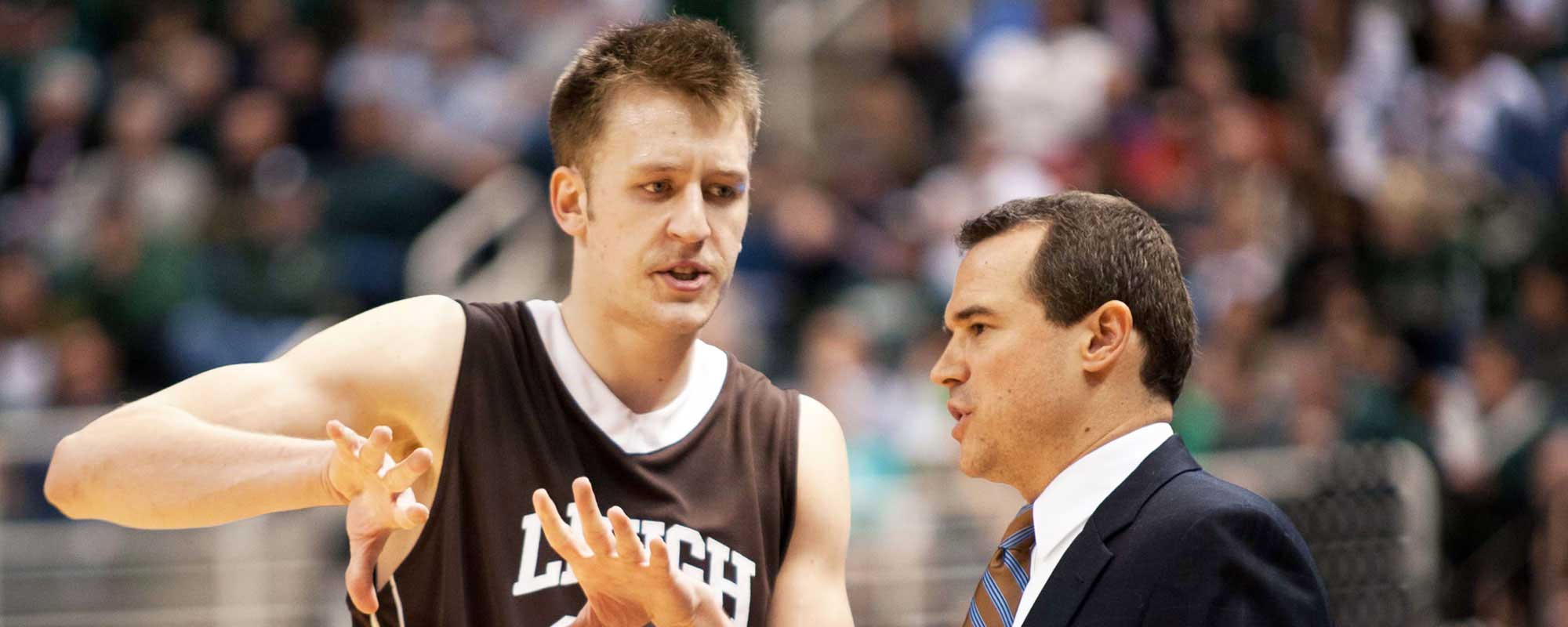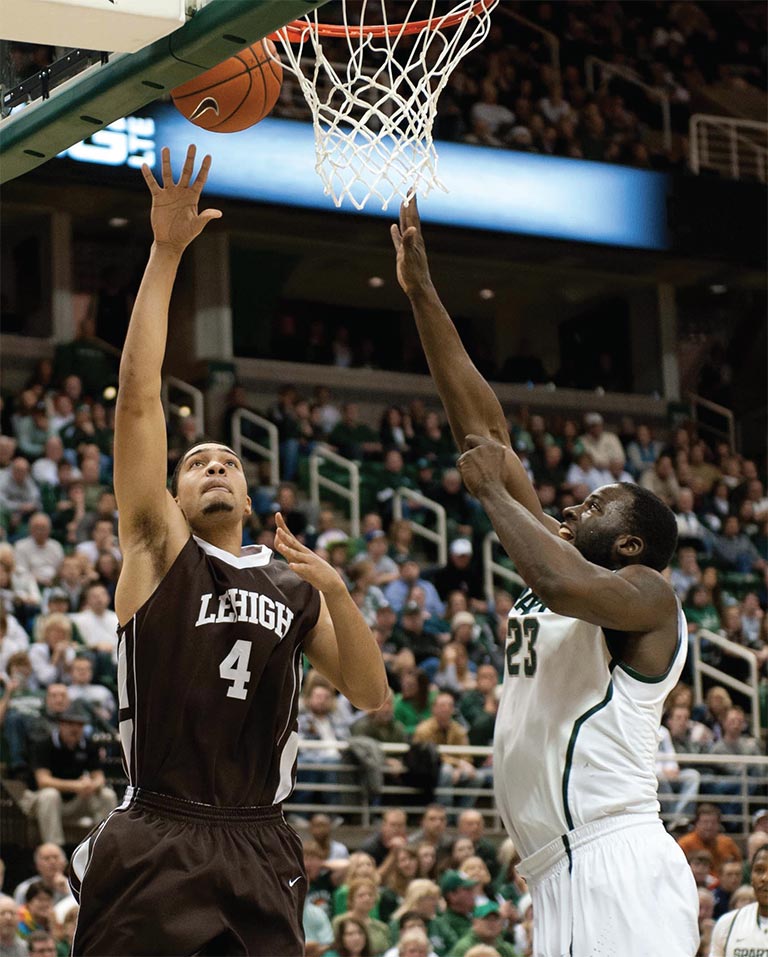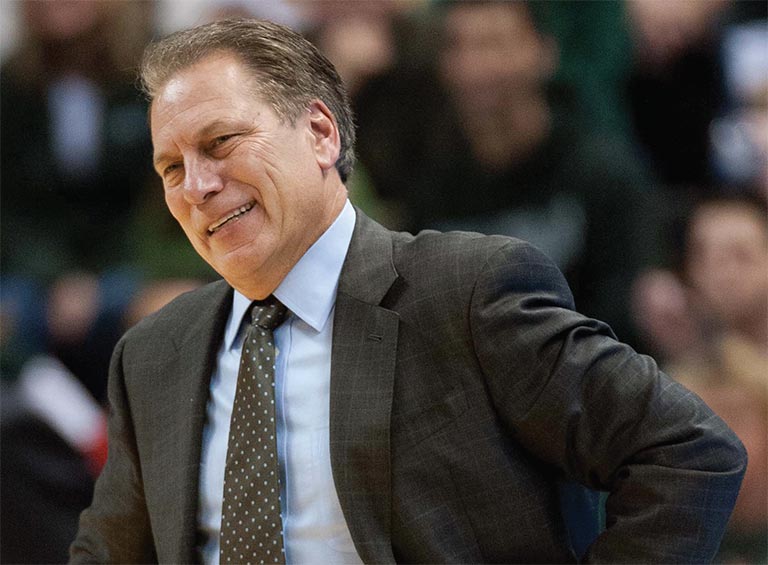

Matt Kerr, Lehigh radio play-by-play man: Expectations were pretty high because of that core group of Gabe and C.J. and Holden, and then they had a couple seniors, Justin Maneri and John Adams and Jordan Hamilton. So it was a veteran group. I'm sure they were predicted to do well, but I'm not sure that anybody saw 27 wins or the way it was at the end.

A FIREBALL: Forward John Adams, left, was someone who “would just work so hard, almost to a fever pitch,” says Coach Brett Reed. His defensive intensity played a large role in the team's success.
Reed: Our first game was against St. John's in New York, and we played a pretty competitive game. We ended up losing it right at the end. We had an unforced error, and we kind of were scratching at the door to maybe get a signature win. It would have really started us out. But it felt like we were really competitive in that game, and we kind of let one get away from a big moment.
Maneri: That St. John's game—that was the one we should have had. We were 10, maybe 20 points better than them. But it was the first game of the season, we had a couple guys foul out. But even though we lost, it kind of set the tone. St. John's was supposed to be this great team, but we knew we should have beaten them.
Lehigh lost the next game against a strong team in Iowa State, then won nine of the next 10 games, home and away. Just before Christmas, the Mountain Hawks took on a talented Michigan State team led by power forward Draymond Green, now a star with the Golden State Warriors, and legendary coach Tom Izzo. The Mountain Hawks went toe-to-toe with the eventual tournament No. 1-seed Spartans but lost another close one, 90-81.
Reed: [Michign State was] a physical team, and we really had to figure out ways to kind of make up for our lack of size, or at least find a way collectively that we could hang tight enough to challenge against an excellent team. And for the most part, we did that.
Greiner: Those guys were the big guys where I'm from [Michigan] and that night I was being guarded by Draymond Green, and I scored 24 points on him. C.J. got in foul trouble, and I was the guy getting the ball for a while there. That game just gave me confidence. We ended up losing, but it gave me confidence, so when I'm coming off the bench [later that season] against Duke and Mason Plumlee, I've got no fear. I looked at it as, "I'm a player, he's a player, whatever it takes, I'm going to win." We learned we could play with those kinds of guys. A loss is only a loss if you don't learn anything from it, and those games really prepared us for the tournament.
McCollum: A loss is a loss, but you learn a lot from it just because you're playing against a high major team who's ranked in the country with a lot of tradition. So for us it was just a measuring stick to see where you were at and see how much better you needed to get before you were ready for the NCAA Tournament.

GOING TOE-TO-TOE: Legendary Michigan State coach Tom Izzo, whose Spartans knocked off Lehigh in a tight early-season matchup, came away impressed with Coach Brett Reed's defensive strategies.
Reed: [After the game] Tom Izzo walked with me all the way back to the concourse, talking about our coverage and what we were trying to do, and how our team was playing, all really complimentary. ...There was a respect from an elite-level coach on what we were trying to do, and the way in which we were going about doing things, and he was really curious to some degree.
Maneri: The reason that game was important was the fact that we were actually running with them. It wasn't a game where we had to make a bunch of comebacks, there were no big swings. We were out there trading baskets with those guys, holding them and playing great defense. I think everyone felt the same—even though we had lost, it really motivated us.
Knutson: You never feel good coming out of a loss, but [because we competed with Michigan State], on Selection Sunday when Duke came up, we had a sense that we were going to be able to compete with them too. I don't think we were saying, "We're going to win," but we really knew we could compete with anybody. We just had a certain confidence about us.
After Michigan State, Lehigh entered Patriot League play, opening up with a tough loss to Holy Cross. In the games that followed, Lehigh pulled out league wins but also lost at home to archrival Bucknell. Coach Reed wanted a signature win, and sought it against highly regarded American in early February. He wouldn't get it—Lehigh blew an early 21-10 lead and lost.
Reed: In my mind we're still not playing like an elite-level team. We had dropped a couple games. And I remember distinctly the game, at American. It had gotten to the point where we didn't have enough of a defensive identity and enough toughness. It was after that game that we had a change in our starting lineup and put John Adams in. He was kind of like a fireball, somebody who would just work so hard almost to a fever pitch. That was almost symbolic but a catalyst for the change of our season. We were going make sure that it wasn't just about outscoring people. We were going to put a signature on our defense and put that mark on our team. This is the direction we needed to go.
Knutson: We always knew where we were supposed to be [on defense]. As painful as it can be to run through the same plays over and over again and keep drilling on all of the defensive set ups and all of the screens—that wasn't fun—we knew our defense. We knew game plans. We knew scouting reports. We knew who the other team's shooters were, and we knew their tendencies.
Reed: We wanted to win the regular season championship, and we were flirting with not being able to do that, because offensively, we had gone cold against Bucknell. We had put ourselves in a position competitively with these games to score it and defend enough, but it was time for us to take another step.
Lehigh would not lose again until its second game in the NCAA Tournament.